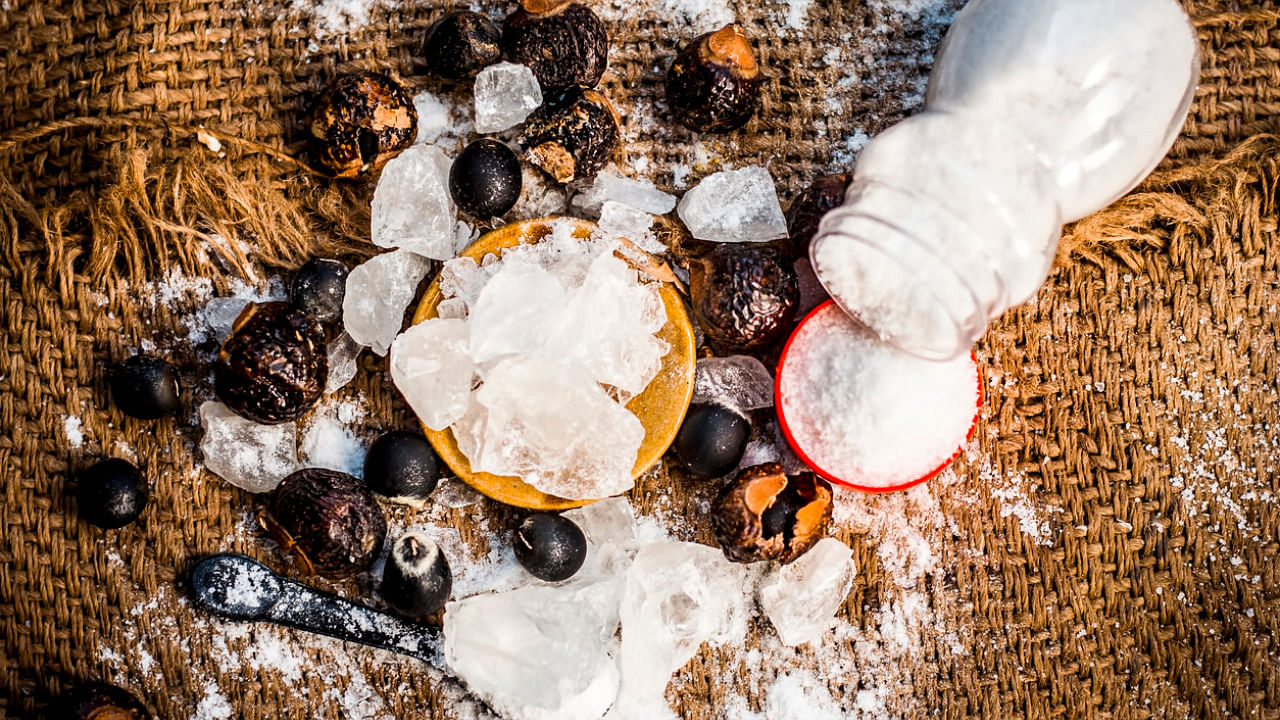
A viral message widely shared across WhatsApp and Twitter suggests that inhaling the vapour of camphor, clove, ajwain and eucalyptus oil can increase blood oxygen level and even relieve respiratory distress. Alt News Science found that there is no scientific basis to support this claim. Instead, sniffing the mixture can cause camphor poisoning, which in some cases is life-threatening.
Union Minister of Minority Affairs Mukhtar Abbas Naqvi had shared the claim on Facebook amid rising Covid-19 cases.
Viral text in English: “Camphor, lavang (clove), ajwain, few drops eucalyptus oil. Make potli and keep smelling it throughout the day. This helps increase oxygen levels and congestion. This potli is given to tourists in Ladakh when oxygen levels are low. It’s a home remedy.
Claims:
Camphor, clove, Ajwain and Eucalyptus oil can increase the blood oxygen level.
Camphor, clove and Ajwain can relieve respiratory distress in Covid-19 patients.
Verdict: False
Fact-check:
1. Camphor (Karpur)
Camphor is a flammable white crystalline substance that has a strong aromatic odour. It is sometimes rubbed on the skin to reduce pain and itching.
It is also used in topical nasal decongestant gels like Vicks VapoRub in small quantities (4-5%) but the evidence on its efficacy is mixed. Some older studies have found that camphor and eucalyptus have no effect on nasal decongestion.
Nevertheless, blood oxygen saturation decreases in severe Covid-19 infections because of the lungs and lower respiratory tract damage and has little to do with nasal blockage. Similarly, another research suggests that relieving nasal obstruction doesn’t improve depressed oxygen saturation.
Inhalation or ingestion of uncalibrated doses of non-medicinal camphor can lead to severe toxicity within a few minutes of exposure, especially in children.
As per the American Association of Poison Control Center’s report, in the year 2018, there were around 9,500 cases of camphor poisoning in the USA, 10 of which were life-threatening and caused significant disability. FDA advises against doses of 11% or more C=camphor as it can cause toxicity and result in severe seizures.
The US’s Center for Disease Control (CDC) has extensive toxicity data that shows that camphor exposure causes significant impairment in animals.
As per CDC’s guidelines, inhalation of camphor vapours can lead to nose, throat and eye irritation. It can cause seizures, mental confusion, stomach ache and in higher concentration, it can also lead to death in some cases. There are several reported cases in India of poisoning caused by camphor vapour inhalation.
2. Clove (lavang)
This claim is based on a single literature review from Italy that hypothesizes the possible anti-SARS-CoV-2 effects of cloves. However, the research cited within this review is based on the herpes simplex virus and is unrelated to SARS-CoV-2. The cited research is based on a compound eugenol which is found in cloves, cinnamon, nutmeg and basil and is linked with toxicity. Although the pure extract of eugenol is not recommended in this viral text, clove vapour alone may be toxic but there is no research to suggest it can increase blood oxygen or relieve respiratory distress.
3. Carom seeds (Ajwain) and Eucalyptus oil
For both substances above, there is no research or evidence to suggest that they increase blood oxygen or relieve respiratory distress.
Conclusion:
Other versions of the WhatsApp forward also attribute the message to ayurvedic practitioner Prajagraj Dabhi who supposedly treated Covid-19 patients with the formulation. Dabhi has rejected this claim.
Yet other versions also claim that ambulances are using this formulation on Covid-19 patients. However, no such treatment guidelines are mentioned in the Health Ministry’s protocol for Covid-19 ambulances.
There is no proof that camphor, clove or carom seeds increase blood oxygen or provide relief during respiratory distress. These may work as a ‘feel good’ therapy during mild respiratory infections or inflammatory sinusitis. Suggesting that they can increase the blood oxygen level in Covid-19 patients can cause people to rely on the home remedy and not take medical help. Sniffing the mixture can also cause camphor poisoning, which may be life-threatening in some cases.